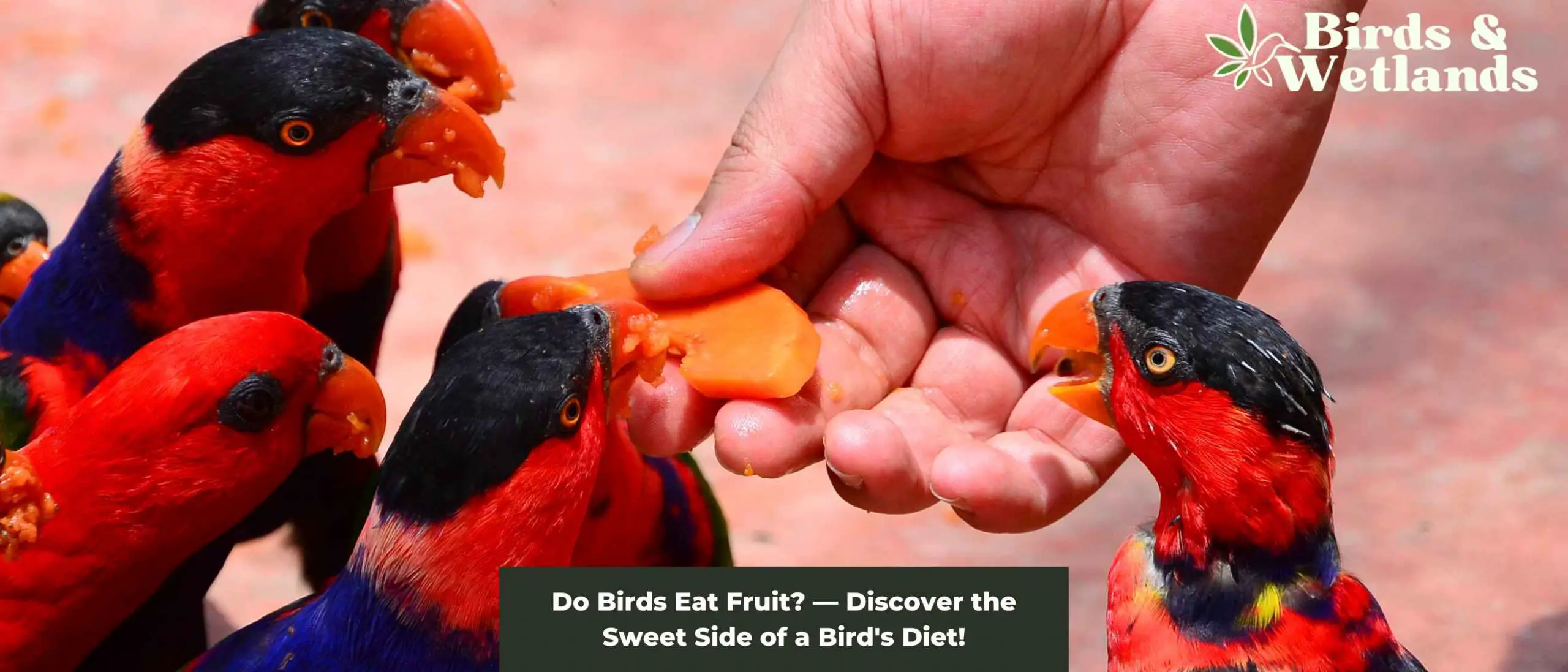Yes, birds do eat fruits! In fact, fruits make up a significant part of their diet and play an important role in their survival. From small birds like sparrows to large birds like toucans, birds have a variety of beak shapes and sizes that allow them to eat a wide range of fruits. There’s a even a group of birds called frugivorous birds that specializes in eating fruits.
This adaptability makes them an important part of many ecosystems, as they help to spread seeds and pollinate plants.
Key Takeaways on Feeding Birds Fruit
Can Birds Eat Apples?
Birds can safely eat apples and benefit from the nutrients that apples offer. Apples are a great source of vitamin C, fiber, and other important minerals. They are also low in sodium, fat, and cholesterol, making them a healthy snack for birds.
However, it is important to note that apple seeds contain cyanide and should not be consumed by birds as they can be toxic.
When feeding apples to birds, it is best to peel them, so you know none of the seeds will be accidentally consumed. Apple flesh and skin are safe for birds to eat and provide important nutrients that help keep their feathers looking bright and healthy.
The flesh of an apple can act as a treat for bird species such as parrots or magpies since many birds enjoy the taste of fruit. Even though apples do not provide high levels of protein or fat like other foods often served to birds, they are a good supplement because of their nutritious value.
Can Birds Eat Oranges?
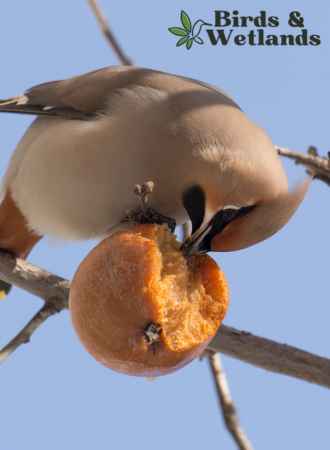
Yes, birds can eat oranges. The acidic flesh of the orange halves and the sweet scent of its juice is a favorite for many species of birds.
Not only are oranges tasty for birds, but they are also a great source of nutrition. Oranges contain high levels of vitamin C and dietary fiber, which help to keep birds healthy and give them energy.
Vitamin B1 (thiamin) is also found in substantial amounts in oranges, important for maintaining healthy neurological function in all animals, including birds.
As a bonus, oranges are a great source of antioxidants that help to protect against disease-causing free radicals.
Oranges can also help keep pet birds busy and entertained as part of an enriching diet. Birds love to bite into the juicy orange skin and pick out the seeds inside; this activity will help keep them mentally stimulated and engaged in their environment. Some people even use juice-filled orange slices as bird feeders that attract wild birds into their gardens.
Can Birds Eat Grapes?
Yes, birds can eat grapes! In fact, many species of birds enjoy eating grapes as a tasty snack, and it is not only safe for them to eat but also quite nutritious.
Grapes are packed with vitamins C, K and B6, potassium and calcium. These vital nutrients help to keep birds healthy and provide them with much-needed energy, which helps them during their long migrations or when they are looking for food.
The sweetness of the grapes makes them a welcome treat for birds that require frequent snacks to maintain their energy levels.
Eating grapes could also help boost a bird’s immune system due to the presence of antioxidants in the fruit. Numerous benefits are associated with adding grapes to a bird’s diet.
Can Birds Eat Blueberries?
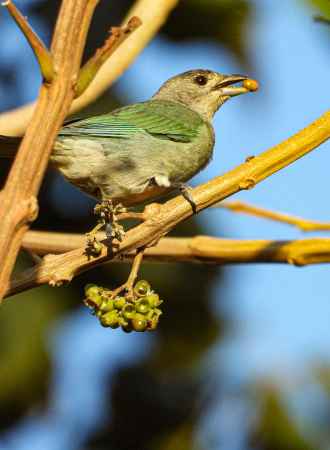
Yes, birds can eat berries such as blueberries. Blueberries are a commonly enjoyed food source among many species of birds, particularly songbirds and game birds. These fruits are high in antioxidants, vitamins, and minerals, which provide important nutrients for birds’ health and well-being.
Blueberries grow on bushes and are native to North America, but they are now widely cultivated in many parts of the world. The fruit is small, round, and blue to black. It has a sweet, tart flavor and a juicy texture that birds find appealing. The fruit is available fresh or dried, and many birds will feed on both forms.
Birds that commonly eat blueberries include American robins, blue jays, northern mockingbirds, red-bellied woodpeckers and cedar waxwings, among others. These are omnivorous birds, which means they feed on both plants and insects. Blueberries provide a valuable source of carbohydrates and other nutrients to help these birds maintain their energy levels and overall health.
In the wild, blueberries are typically available in late summer and early fall, and they can be a crucial food source for birds preparing to migrate. Migrating birds rely on fat stores to fuel their long journeys, and consuming high-energy foods like blueberries can help them build up these stores.
For bird lovers, offering blueberries in your backyard bird feeders can provide a fun and easy way to attract birds and observe their behavior. Blueberries can be provided fresh or dried and combined with nuts, seeds, or suet.
Can Birds Eat Raisins?
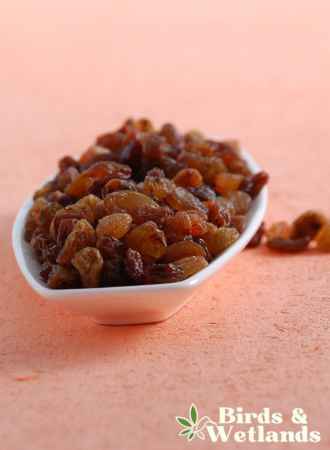
Yes, birds can eat raisins and other dried fruit. Raisins are dried grapes, which are a natural food source for birds. As such, many bird species, such as house sparrows, finches, and doves, have been observed eating raisins. In the wild, birds often feed on various fruits and berries, and raisins can provide a source of energy for them.
However, it is important to note that raisins should only be offered to birds in moderation as they contain high amounts of sugar. In large quantities, raisins can cause digestive problems and lead to obesity, which can negatively affect the overall health of birds.
Raisins can attract insects and other pests, so they should be offered in a clean and safe environment to prevent contamination.
It is also crucial to consider the type of bird you are feeding. Some species, such as canaries and other small songbirds, have delicate digestive systems and may not be able to tolerate raisins.
Some fruit birds may naturally dislike raisins and may not eat them even if offered.
What are the fruit-eating birds in North America?
Here’s a list of backyard birds that eat fruit:
| Fruit-Loving Birds | Fruits Eaten |
|---|---|
| Cedar Waxwing | Apples, Cherries, Elderberries, Grapes |
| American Robin | Cherries, Berries, Grapes |
| Baltimore Oriole | Oranges, Grape Jelly, Nectar |
| Red-Bellied Woodpecker | Berries, Nuts |
| Blue Jay | Acorns, Berries |
| Northern Cardinal | Cherries, Berries, Sunflower Seeds |
| Scarlet Tanager | Wild fruits, Berries |
| Rose-Breasted Grosbeak | Cherries, Berries, Sunflower Seeds |
| American Goldfinch | Black Seeds, Berries |
| Indigo Bunting | Berries |
What other fruits do birds eat?
Here’s a short list of other fruits birds love to eat:
Bananas
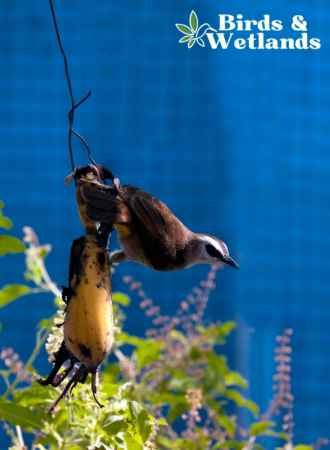
Bananas are a great nutritional food for birds. Not only are they packed with essential minerals and vitamins, but the high nutrient content also gives birds a great deal of energy and helps keep them healthy.
Bananas are loaded with Vitamin C, which helps strengthen their immune system and allows birds to fight off diseases. Vitamin C is also an important antioxidant that helps to protect against cellular damage caused by oxidation.
Bananas also contain iron, an essential mineral for red blood cell production and the transportation of oxygen around the body.
Bananas are an excellent source of dietary fiber and provide a feeling of fullness and energy. Fiber plays an important role in helping to regulate the digestive system and keeping the gastrointestinal tract healthy. High-fiber foods also help to lower blood cholesterol levels and reduce the risk of cardiovascular disease.
Bananas contain minerals such as potassium, magnesium and phosphorus, which are essential for healthy bones and muscles. They are also sources of some interesting B vitamins such as thiamine, vitamin B-6 and pantothenic acid, which all help boost the immune system and improve overall health.
Cranberries

Cranberries contain antioxidants and nutrients that help keep birds healthy and strong. They contain Vitamin A, Vitamin C, essential trace elements and minerals, such as iron, phosphorus, and magnesium. The high antioxidant content helps protect birds from free radical damage caused by environmental toxins.
Cranberries are also high in fiber, which aids in digestion and helps keep a bird’s weight in check. The high content of Vitamin A helps maintain the integrity of a bird’s skin and feathers, which are important for keeping them warm during cold seasons and providing a protective barrier against the elements.
Cranberries also help boost a bird’s immune system to protect it against bacteria and viruses. Cranberries help improve the overall health of a bird’s gastrointestinal tract, which is important for proper digestion and nutrient absorption.
Cranberries are a highly palatable treat for birds and are an excellent supplement to a bird’s diet. In cranberries are a low-calorie food that can be safely given in moderation.
Melons
Melons are an excellent food choice for birds and are generally well-liked by most species. They are packed with vitamins, minerals, carbohydrates, and other important nutrients that help ensure healthy feathers, bones, and reproductive organs.
Melons are excellent sources of water, which can be scarce in the wild, especially during hotter summer months. The high water content ensures birds stay hydrated and helps balance electrolytes, resulting in a healthier life.
Furthermore, the seed-filled centers of melons are a great source of essential fats and proteins and other essential amino acids.
How to Feed Birds Fruit
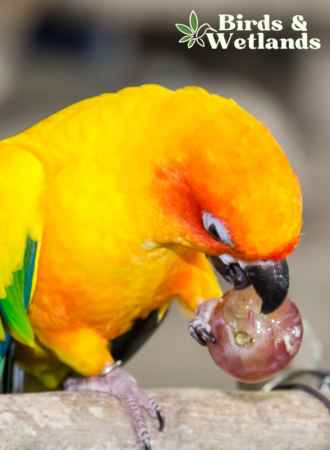
Feeding birds fruit is a popular and rewarding activity for many bird enthusiasts. It provides most fruit-eating birds with a source of nutrition and is a good way of attracting birds to your your yard or bird feeder. Here are some steps to follow when feeding fruit to winter birds:
- Choose the right fruit. Offer a variety of fruits to attract different species of colorful birds. Some popular options include apples, bananas, grapes, oranges, raisins, and strawberries. Avoid feeding birds too many citrus fruits, as they can be acidic and harmful to birds. Only offer as much fruit as a bird can eat in a day. Small birds eat small fruits while large birds will eat larger fruits.
- Prepare the fruit. Cut fruit into small pieces, making it easier for birds to eat. Remove any seeds or pits, as they can pose a choking hazard to birds. You can put small chunks in a mesh bag or a suet cage. You can also feed birds with fruit rinds with a few flesh left. Some hanging feeders have special features that can accommodate fruit and suet cakes.
- Provide a clean bird-feeding station. Clean and disinfect your bird-feeding stations and platform feeders regularly to prevent the spread of disease. Offer the fruit on a tray or platform feeder, which allows multiple birds to feed at once and makes it easier for you to clean.
- Offer fruit in moderation. While fruit is a nutritious food source for birds, it should not be the sole component of their diet. Too much fruit can lead to digestive problems and malnutrition. Offer fruit in moderation as a supplement to their regular diet of seeds and insects.
- Monitor fruit consumption. Observe the birds feeding on the fruit to ensure they are consuming it in moderation and not being overwhelmed by too much fruit. Keep in mind that fruit is perishable, so remove any uneaten or spoiled fruit and replace it with fresh fruit every few days. Doing so can also prevent unwanted pests from your garden.
- Plant fruit trees. Fruit trees such as apple trees and prickly pear are a great way to attract birds because they provide a bounty of food for feathered friends all year round. In the spring, the fruit trees will provide blossoms which will attract bees and other flying insects, which in turn will draw other birds to your garden. In the summer and fall, fruit will ripen on the trees providing a steady source of food for hungry birds. The fallen fruit also serves as food for small animals which in turn will attract birds of prey.

